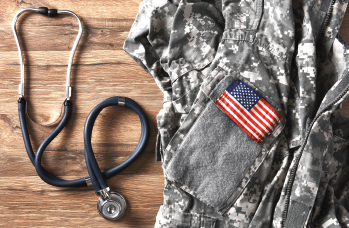
© Steve Cukrov / shutterstock.com
Born in 1974 and raised in rural Harrisonburg, Va., located in the bucolic Shenandoah Valley, Philip Zapanta, MD, spent his childhood observing his father, a general practice otolaryngologist who ran a single-physician private practice in their hometown. He saw firsthand his father’s rigid work ethic and the daily pressures that went into sustaining a solo surgical practice. The young Zapanta—a self-described introvert—was fascinated by his father’s stories about his patients, and by the vivid surgical photographs his father brought home.
Explore This Issue
June 2020Hoping to chart his own course, Dr. Zapanta volunteered with orthopedic surgeons at his local hospital. Yet when the time came to choose his own path, he instead confidently selected otolaryngology, figuring it was the best fit. Unfortunately, Dr. Zapanta didn’t initially match in otolaryngology, but he steadfastly persevered, eventually matching in otolaryngology and successfully completing his residency.
On Sept. 11, 2001, four months into his year as a general surgery intern, that day’s series of horrific events changed the course of his life. American Airlines Flight 77 was hijacked by terrorists and crashed into the Pentagon just a few miles from where Dr. Zapanta, his wife, and their one-year-old son lived in Virginia. As Dr. Zapanta watched the news, he felt a surge of patriotism. One year later, he enlisted in the United States Army Reserve Medical Corps.
Today, Dr. Zapanta is an associate professor of surgery in George Washington University’s (GW) division of otolaryngology and program director of GW’s otolaryngology residency program. He’s also a Lieutenant Colonel in the Army Medical Corps. In summer 2019, Dr. Zapanta was deployed to Iraq to support Operation Inherent Resolve, and he has received numerous awards for his military service.
The following interview, condensed and edited for clarity, was conducted in Dr. Zapanta’s office at GW in Washington, D.C., in December 2019.
Dr. Sarah Rapoport: How did the events of 9/11 induce you to enlist?
Dr. Philip Zapanta: I had thought about enlisting in the military for a long time before 9/11. I have several cousins and uncles who’ve been in the military, and my grandfather was a guerilla fighter in the Philippines during World War II. I even briefly considered applying to [the U.S. Military Academy at] West Point or to the Naval Academy while I was in high school. After 9/11, I was enraged by the terrorist attacks, so on Sept. 9, 2002, I signed my commission.
SR: Did your enlistment conflict with your residency training?
PZ: That was the biggest concern I had when I enlisted as a resident. But because I joined the military as a reservist, I was permitted to finish my surgical training before completing any tours of duty. Once I completed residency training, they would call me up to perform “back-fill,” meaning when active otolaryngologists were deployed, I would run their practices in their absence—the year after I finished my residency training, I was called up to do back-fill in Fort Sill, Oklahoma.